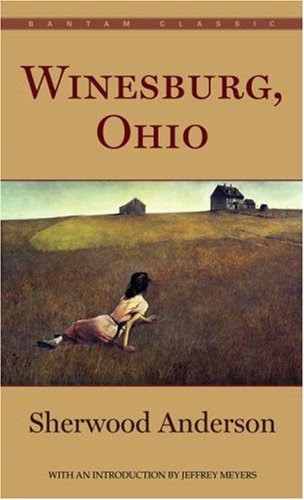In Winesburg, Ohio by Sherwood Anderson, the idea of lost dreams is laced through every story.
One example would be in the chapter Adventure, the dream of love and companionship is lost. Alice Hindman is a woman in Winesburg, and as a young woman she fell in love with a man named Ned Currie. However he leaves for Chicago to seek fortunes and she remains faithful to him because she feels that she can only see a future with him. Over the years, Ned forgets about Alice, but Alice's love for him still burns on like an endless candle. As the years pass, her dream of being married to Ned dies as she realizes that her fantasy will never step foot into her reality. In the chapter, the narrator states "she thought, and turning her face to the wall, began trying to force herself to face bravely the fact that many people must live and die alone". This statement embodies the depressing idea that many dreams die with age, no matter how much we refuse to let them go.
Another example can be found in the chapter Loneliness. Enoch Robinson is the main character in this story, and he dreams of expressing himself and being understood. Enoch moves to New York City with the aspiration of becoming an artist. He eventually falls into a group of young artsy people, and he often invites them to his apartment where they can examine his artwork and have intellectual conversations. However because Enoch's paintings are so cryptic, no one understands them except for himself. And because he is so immensely inept at expressing himself, he never explains the meanings behind his artwork. He soon becomes frustrated at the fact that these people cannot understand him, and his dreams follow the guests out the door and out of his life. Enoch soon starts to create his own imaginary friends to accompany him in his apartment. He creates these imaginary friends because they are figments of his imagination, and therefore they always understood him, and always agreed with him. The narrator states, "Among these people he was always self-confident and bold. They might talk, to be sure, and even have opinions of their own, but always he talked last and best". Because these friends are imaginary they further support the idea that his dream never crosses it's way into reality, and that his wish of being understood and the ability of expressing himself will utterly remain imaginary.
These two examples is clear evidence of the idea of lost dreams through out the novel, however there is a passage out of the chapter Sophistication that embodies everything mentioned earlier in the first paragraph of this post. The narrator of the story states, "There is a time in the life of every boy when he for the first time takes the backward view of life. Perhaps that is the moment when he crosses the line into manhood. The boy is walking through the street of his town. He is thinking of the future and of the figure he will cut into the world. Ambitions and regrets awake within him. Suddenly something happens; he stops under a tree and waits as for a voice calling his name. Ghosts of old things creep into his consciousness; the voices outside of himself whisper a message concerning the limitations of life". This passage is so significant to the idea of lost dreams because it literally states word for word about the "limitations of life", and how as an adult you look back to your youth and realize that so many aspirations and dreams slip through your fingers as you march forward in life. That realization that limitations in life prevent you from achieving so many of your dreams is unfortunately the wake-up call that you have crossed the line into adulthood.
Its a sad thought when you realize that so many of your dreams have never come to pass. And it's an even sadder thought watching a child burst with a million dreams and aspirations, knowing that most will never materialize into reality.

